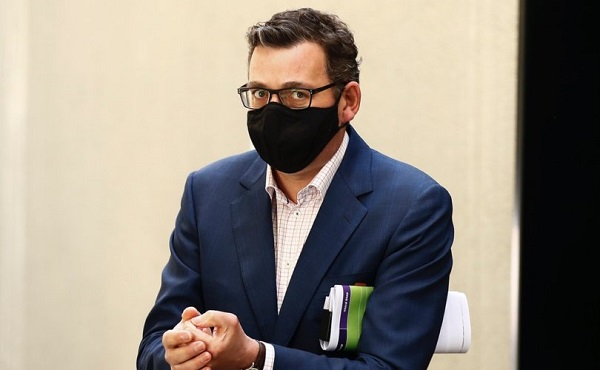Crime
Inside B.C.’s Cultus Lake Narco Corridor — How Chinese State-Linked Syndicates are Building a Narco Empire in Canada
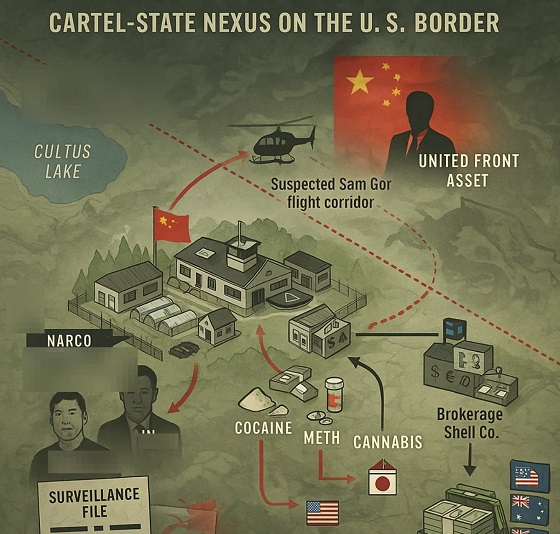
Many of the properties of concern are large-acreage farms with cannabis licenses dating back decades—once controlled by B.C. biker gangs, but quietly consolidated since the early 2000s under the influence of figures linked to the Sam Gor syndicate.
Nestled in British Columbia’s Fraser Valley, hugging the U.S. border, Cultus Lake is surrounded by towering rainforest pines—a postcard image of Canada’s serene beauty. Shaped by the last Ice Age, the south shore’s cavernous ridges form the Columbia Valley, which snakes into Washington State—sparsely populated, with no official border crossing, and peopled mostly by large ranch owners. But the pristine corridor conceals deadly secrets with geopolitical consequences.
According to multiple Canadian intelligence experts, significant Columbia Valley properties have been quietly seized as strategic high ground by associates of the notorious Sam Gor narco syndicate, operating in tandem with agents of the Chinese state’s security and foreign influence apparatus.
“The number of people—nefarious people—who have places down there, it’s quite phenomenal,” an intelligence analyst not authorized to be named said.
“It’s a very difficult place to do any surveillance on. Not a lot of properties, big properties—and anybody that doesn’t have a local license plate or something from there, they just get spotted right away.” Combine that with its location—adjacent to the U.S. border—and, the source added, “it’s got to be some of the most favorable area in the Lower Mainland to be doing any kind of cannabis stuff or drug smuggling.”
Experts describe what amounts to a special zone of Chinese crime and influence activities—tied clandestinely to Beijing in function, if not officially—a secure enclave where key properties have been tied to covert cross-border helicopter operations.
Many of the properties of concern are large-acreage farms with cannabis licenses dating back decades—once controlled by B.C. biker gangs, but quietly consolidated since the early 2000s under the influence of figures linked to the Sam Gor syndicate. The networks tied to these estates, sources say, not only profit from cannabis and sophisticated money laundering brokerages that transfer illicit proceeds—ultimately benefiting the Chinese state—but are also linked to Beijing’s so-called “CCP police station” activities, and numerous significant investigations into fentanyl, methamphetamine, heroin, cocaine, and Chinese precursor imports.
According to one source familiar with U.S. government investigations in British Columbia, one Columbia Valley property stands out with exceptional urgency. Spanning roughly 30 acres and situated steps from the U.S. border, the estate has triggered alarms among The Bureau’s national security sources—not only due to its strategic location, but because of the individuals connected to it.
Chief among them: Sam Gor himself, the syndicate’s elusive boss, a Chinese Canadian named Tse Chi Lop. Of equal or greater concern: a senior Chinese security and intelligence figure with ties to Sam Gor’s upper command, and individuals associated with Chinese mining and chemical interests and Beijing’s United Front Work Department.
According to RCMP sources, the site has also been linked to numerous narcotics investigations in Western Canada and cross-border helicopter activity into Washington State—escalating it from regional concern to a geopolitical flashpoint between Ottawa and Washington.
Among other key figures linked to the property: Peter Lap-San Pang, a Toronto-based alleged Sam Gor associate named in a British Columbia civil forfeiture case involving a suspected illegal mansion casino; and Ye Long Yong, a convicted Sam Gor “kingpin” identified in Canadian court files for importing, exporting, and trafficking heroin, methamphetamine, and cocaine. During a parole hearing, Ye told officials that “a successful person in Toronto gave” him his drug business.
The parole records noted: “There was a great deal of effort from many police organizations from all around the world, with interpreters in several languages and evidence gathered for a long period of time in order to infiltrate and bring down Mr. YE’s criminal organization.”
Also tied to the property is a United Front–associated “Big Circle Boy” contemporary of Tse Chi Lop, who was named in B.C.’s anti-money laundering inquiry as the superior of Paul King Jin—the notorious boxing gym owner, loan shark, and money laundering suspect at the center of Canada’s largest-ever casino money laundering investigation, E-Pirate.
These are just several of the “many other Sam Gor members” associated with this 30-acre farm on the U.S. border, a source said—individuals who have surfaced repeatedly in B.C.’s highest-profile organized crime investigations over the past two decades, including the E-Pirate case.
Most of the Sam Gor and Chinese state-linked suspects tied to this particular Chilliwack-area border property—with the exception of Tse Chi Lop—remain less publicly known than Paul King Jin, whose notoriety has steadily grown since the Vancouver Sun’s 2017 revelations about the RCMP’s failed E-Pirate probe. Jin later survived a high-profile targeted shooting at Richmond’s Manzo restaurant in 2020—an attack that killed his business partner, Jian Jun Zhu, another Sam Gor leader allegedly behind the Silver International operation. That Richmond-based scheme—now infamous for revealing the “Vancouver Model” of money laundering—is believed to have moved hundreds of millions in drug proceeds through a combination of government-regulated and underground casinos, with links to drug-cash banks embedded in diaspora communities across the Western Hemisphere, including Mexico, South America, and hundreds of Chinese bank accounts.
More recently, The Globe and Mail reported troubling information—verified by The Bureau—that Canadian security officials had clandestinely surveilled Jin and other Chinese businessmen privately meeting with then–Prime Minister Justin Trudeau in a Richmond hotel, during the height of the E-Pirate and related Chinese narcotics trafficking investigations in British Columbia.
The U.S. government’s concerns about transnational money laundering suspects tied to this nexus—including individuals connected to Columbia Valley properties and the private meeting with Prime Minister Trudeau—were underscored by a request for RCMP assistance in surveilling several Chinese nationals who, according to one source, arrived in Vancouver on a private jet.
Yet while Jin drew headlines in Canada, Sam Gor leader Tse Chi Lop—who holds Canadian citizenship—operated far more quietly across Vancouver, Toronto, Hong Kong, Macau, Taiwan, mainland China, and the United States prior to his arrest in the Netherlands several years ago. He has long been identified as a top figure in what former U.S. State Department investigator David Asher describes as the “command and control” layer of Chinese Communist Party-linked money laundering in Toronto and Vancouver, facilitating the financial operations of Mexican, Latin American, and Chinese cartels across the Western Hemisphere.
“Tse [Chi Lop] has a long history here [in British Columbia],” one Canadian intelligence expert said. “He’s connected to Jin and the network out here.” Regarding the elite Sam Gor members associated with significant Columbia Valley properties, they added: “There’s state interaction with some key components of those groups.”
One of the key figures associated by Canadian intelligence with the 30-acre Columbia Valley farm, Ye Long Yong, is also little known outside elite international law enforcement circles. But his role in Sam Gor’s transnational operations from Vancouver was extremely significant, an intelligence source said. Filings from his parole hearings underscore this, stating: “Mr. YE operated his criminal organization for years prior to his arrest. He demonstrated his ability to conceal his illegal activities from the authorities for many years.”
Pointing to yet another high-profile property near Cultus Lake, a different source said: “There’s another very, very significant Asian organized crime woman—she had a heavy influence out in that area, to do with cannabis. And she apparently had a lot of higher-level Chinese government connections.”
Another source, familiar with a federal investigation involving an organized crime figure flying a helicopter from the Cultus Lake region into U.S. territory, emphasized long-standing frustrations between allied agencies. “With the choppers and this area around Cultus Lake, I don’t think the Border Integrity team at Federal Serious and Organized Crime has ever truly continued paying attention,” the source said. “That’s why DEA and others are so pissed with the RCMP—not truly following up, not looking at the details. That corridor has been known for years.”
For Canadian intelligence veterans watching the pattern, the explanation points to more than simple organized crime. “This is for years to come,” one source said. “You set things in place in environments you can monitor, inside and out. Thinking like special forces—you pick the high ground, the environment where you can survey everything around you to maintain the integrity and safety of your product. That’s why the corridor is so special to organized crime. You can do that there.”
While these properties—and the alleged helicopter missions they support into the United States—offer a visceral glimpse of the threat posed by Chinese transnational networks engaged in poly-narcotics trafficking and money laundering, the deeper, state-linked financial architecture behind them is best illustrated by the RCMP’s startling findings. Investigators uncovered a global laundering network rooted in Vancouver-area brokerage houses, discreetly embedded in residential neighborhoods. These firms are tied to large-acreage land acquisitions across British Columbia used to cultivate cannabis for Asian organized crime.
Beneath the surface, authorities believe these operations fuel a broader system of poly-drug laundering, narcotics transshipment to other nations concealed within Canadian consumer exports, and coordination with Beijing’s foreign influence apparatus.
The Bureau will report next in this series on a groundbreaking investigation into the United Front brokerage system—an apparatus that facilitated narcotics trafficking from British Columbia into New York City and laundered drug proceeds from the United States back to Sam Gor and United Front networks in Vancouver.
There is mounting evidence that this same system—leveraging “legal” cannabis operations and money laundering brokerages tied to crime figures associated with Chinese consulate diplomats—is now suspected of operating not only in British Columbia but also in Ontario, with transnational reach into multiple U.S. states, including Maine.
Yet only fragments of evidence in official Canadian files hint at the “interoperability” between Chinese narco networks and the United Front Work Department, including its political influence arms.
British Columbia and Ontario have emerged as key battlegrounds where Chinese interference and triad-linked organized crime networks have deeply penetrated society. According to Canadian and U.S. experts who spoke with The Bureau, this includes the integration of the Sam Gor syndicate with Beijing’s intelligence and foreign influence apparatus, operating under the umbrella of the United Front Work Department.
Due to the sensitivity of the matter, the only expert identified in interviews is David Asher, who stated that the U.S. government views the United Front as the envelope surrounding China’s underground banking and financial networks—the same networks believed to have infiltrated TD Bank in Toronto.
Multiple Canadian police sources across British Columbia, Alberta, and Ontario confirmed that Chinese diplomats have been observed meeting with senior figures in Asian Organized Crime, including actors tied to the 30-acre “farm” property on the U.S. border near Cultus Lake.
The only known record pointing to official Canadian acknowledgment of these networks was first obtained by Global News in its reporting on Beijing’s Fox Hunt operations. The document—drafted at the request of B.C.’s Solicitor General in 2023—prompted the RCMP to prepare a classified briefing for Premier David Eby’s government. The version released under Freedom of Information legislation was completely redacted and titled: “The People’s Republic of China: Foreign Actor Influence Undertaken by the Chinese Communist Party / United Front Work Department & Interoperability with Transnational Organized Crime.”
Editor’s note: Come back to read The Bureau’s exclusive, paywalled investigation into United Front brokerage houses and illicit grow-ops—operations powered by exploited illegal immigrants.
The Bureau is a reader-supported publication.
To receive new posts and support my work, consider becoming a free or paid subscriber.
Invite your friends and earn rewards
Crime
Pam Bondi Reveals What The Holdup Is With Epstein File Release


From the Daily Caller News Foundation
By Harold Hutchison
Attorney General Pam Bondi told reporters Wednesday that the FBI is still reviewing “tens of thousands” of child porn videos that were in the possession of Jeffrey Epstein.
Epstein committed suicide while awaiting trial after he was arrested in 2019 on sex charges. Bondi was asked about the delay releasing the documents pertaining to Epstein by a reporter after announcing plans for a press conference Wednesday.
“The FBI, they’re reviewing… there are tens of thousands of videos of Epstein with children or child porn and there are hundreds of victims and no one victim will ever get released, it’s just the volume and that’s what they’re going through right now,” Bondi said. “The FBI is diligently going through that… I’ll call him later.”
Dear Readers:
As a nonprofit, we are dependent on the generosity of our readers.
Please consider making a small donation of any amount here.
Thank you!
WATCH:
Epstein, who pled guilty to sex charges in 2008, had extensive ties to celebrities, politicians and executives, even after he was a convicted sex offender. Among those who were known to have been close were L Brands founder Lex Wexner, director Woody Allen and Prince Andrew.
Microsoft co-founder Bill Gates also met with Epstein a number of times, as did employees of the Bill and Melinda Gates Foundation. Gates met with Epstein as late as 2019 despite concerns his then-wife, Melinda, expressed according to a May 2021 report by The Wall Street Journal.
The Daily Caller asked President Donald Trump about the delay in releasing the files during an April 22 White House event. “I don’t know, I’ll speak to the attorney general about that. I really don’t know,” Trump told Daily Caller White House correspondent Reagan Reese. “I know that we’ve done the RFK, the Kennedy, Martin Luther King is out there very shortly, so we’ll find out. But … we’ve really, really announced, we’re doing them in full transparency.”
Bondi released the first batch of files regarding Epstein on February 27.
Alberta
Charges laid in record cocaine seizure

From ALERT – The Alberta Law Enforcement Response Team
Five suspects have now been charged in relation to a major cocaine seizure that took place in Edmonton last year. In April 2024 $3 million worth of cocaine and other drugs was seized.
ALERT Edmonton’s organized crime team, in consultation with Alberta Crown Prosecution Service, was able to arrest and lay charges against five suspects on April 21, 2025. The charges are wide-ranging and include participation in the activities of a criminal organization, conspiracy to traffic drugs, drug trafficking, and money laundering.
“Following last year’s drug seizure, our investigative team was able to conduct a thorough investigation and identify the suspects responsible. We now have significant charges put before the courts in the hopes of holding this organized crime group accountable,” said Insp. Angela Kemp, ALERT Edmonton.
The drug seizure was initially announced by ALERT on May 6, 2024. At 27 kilograms of cocaine, it was highlighted as the largest cocaine seizure by ALERT in Edmonton.
The seizure took place on April 30, 2024 when a search warrant was executed at a west Edmonton home in the Lewis Estates neighbourhood.
ALERT alleges that the suspects are part of an organized crime group that was involved in drug trafficking in the Edmonton region, and had also supplied drugs to Grande Prairie and Saskatchewan. ALERT received assistance on the investigation by the Edmonton Police Service and RCMP Federal Policing Northwest Region.
The following suspects were charged:
- Jeffrey Vil, a 45-year-old from Edmonton, is charged with participation in activities of a criminal organization, commission of an offence for a criminal organization, conspiracy to traffic drugs, conspiracy to possess drugs for the purpose of trafficking, possession of drugs for the purpose of trafficking, laundering proceeds of crime, possession of proceeds of crime, and possession of a prohibited device.
- Tommy Szeto, a 35-year-old from Edmonton, is charged with participation in activities of a criminal organization, commission of an offence for a criminal organization, conspiracy to traffic drugs, conspiracy to possess drugs for the purpose of trafficking, possession of drugs for the purpose of trafficking, and laundering proceeds of crime.
- Tayler Fraser, a 27-year-old from Edmonton, is charged with is charged with participation in activities of a criminal organization, commission of an offence for a criminal organization, conspiracy to traffic drugs, and conspiracy to possess drugs for the purpose of trafficking.
- Christian Barwise, a 35-year-old from Edmonton, is charged with drug trafficking.
- Adrian De Guzman, a 27-year-old from Edmonton, is charged with drug trafficking.
The suspects were released from custody and are scheduled to appear in court on May 22, 2025.
Members of the public who suspect drug or gang activity in their community can call local police, or contact Crime Stoppers at 1-800-222-TIPS (8477). Crime Stoppers is always anonymous.
ALERT was established and is funded by the Alberta Government and is a compilation of the province’s most sophisticated law enforcement resources committed to tackling serious and organized crime.
-
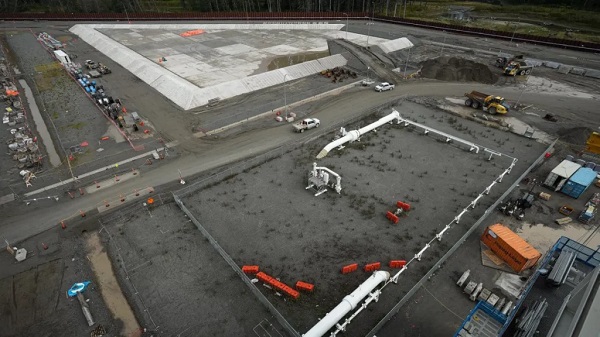
 Energy2 days ago
Energy2 days agoIt’s time to get excited about the great Canadian LNG opportunity
-

 Business2 days ago
Business2 days agoTrump praises Carney at White House, says ‘never say never’ about 51st state
-
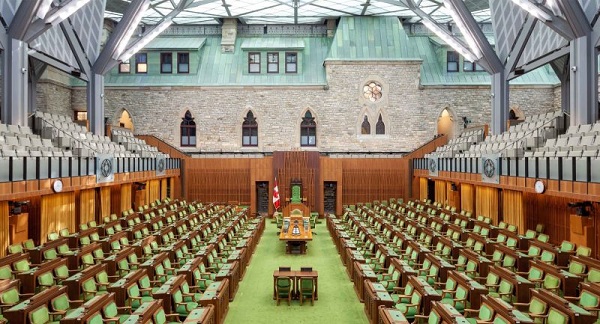
 Business2 days ago
Business2 days agoCanada’s Election Is Over And Now The Real Work Begins
-
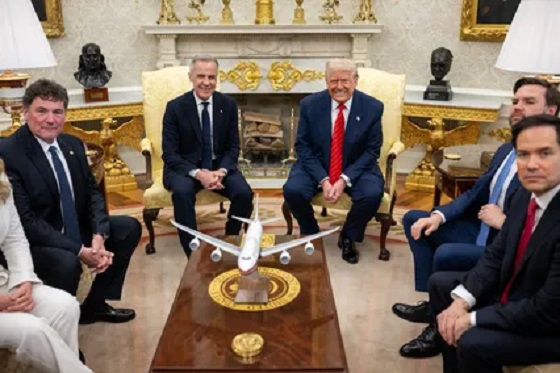
 Business1 day ago
Business1 day agoCarney pivots from anti American campaign, embracing US and hailing Trump as “transformational president”
-

 Daily Caller23 hours ago
Daily Caller23 hours agoMisguided Climate Policies Create ‘Real Energy Emergency’ And Permit China To Dominate US
-

 Also Interesting2 days ago
Also Interesting2 days agoData Loss Prevention Strategies to Improve Google Drive Security
-

 Business1 day ago
Business1 day agoTop business group warns Carney’s ‘net zero’ push spells disaster for Canada’s economy
-

 Health1 day ago
Health1 day agoTrump signs order to stop funding for gain-of-function research believed to have caused COVID




